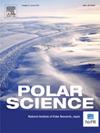Bacterial community structure, adaptations and prevalence of antimicrobial resistance in bacteria from Antarctica: A review
Abstract
Antarctica serves as an ideal prototype to study past climatic condition as the ice core records dates back to 100,000 years. Microbiological research on ice core has opened a doorway to our understanding on biodiversity and its contribution to the frozen ecosystem. In this review, the ice core bacterial diversity of East and West Antarctica has been documented. Cold-adapted bacteria hold immense potential in biotechnological applications as they possess functional advantages over mesophilic bacteria. Some of the neoteric applications of bioproducts of Antarctic bacteria have been stated in this review. The current climate change due to global warming exerts a humongous effect on the ecosystem of the polar region. The region being susceptible to any fluctuation in temperature, the exacerbated melting of Antarctic glaciated mass contributes to the rise of global sea level, with loss of ice harbouring unknown microbial entities. This review mainly focuses on the bacterial diversity of East and West Antarctic counterparts, the prevalence of antibiotic-resistant genes, the adaption strategies conferred by bacteria thriving in Antarctic habitats and their potential biotechnological applications.

 求助内容:
求助内容: 应助结果提醒方式:
应助结果提醒方式:


